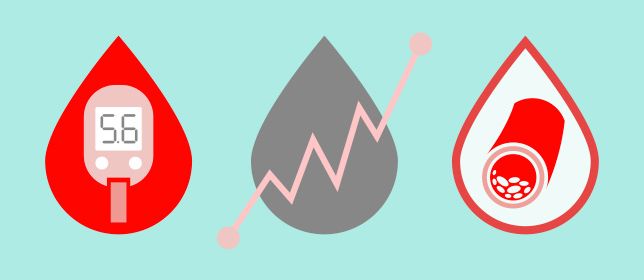
Diabetes
Latest News

Latest Videos

More News

In this episode of Managed Care Cast, Francesco Rubino, MD, discusses the potential bidirectional relationship between coronavirus disease 2019 (COVID-19) and diabetes.

Large telemedicine diabetic retinopathy screening networks based in federally designated safety-net clinics may be able to increase screening access and compliance among otherwise underscreened populations.

For individuals currently in high-risk glycemic categories, losing 2 to 3 kg (4.5-6.5 lb) in combination with increased physical activity over 2 years nearly halved the risk of developing type 2 diabetes (T2D).

Half of patients with type 2 diabetes (T2D) exhibit very high cardiovascular risk while the majority are at a high risk of fatal heart attack or stroke, according to new research published in the European Journal of Preventive Cardiology.

Lowering the higher rates of diabetes seen among racial and ethnic minorities requires solutions to address all of the major factors that contribute to diabetes prevalence.

Black individuals with diabetic macular edema (DME) exhibited a significantly lower likelihood of visual acuity improvement following intravitreal bevacizumab treatment compared with White and Hispanic patients.

New data show combining glucagon-like peptide-1 receptor agonist (GLP-1 RA) exenatide plus sodium–glucose cotransporter-2 (SGLT2) inhibitor dapagliflozin remains effective after 2 years for type 2 diabetes (T2D) uncontrolled with metformin.

A decision was upheld that Johnson & Johnson (J&J) must pay a $2.1-billion fine from a 2018 court decision; 3 major drug distributors face up to $18 billion in opioid-related fines; a new diabetes prevention platform may assist in symptom prevention.

Diabetes and multiple chronic conditions increase overall Medicare spending, but spending increases even more in minority beneficiaries compared with White beneficiaries with similar comorbidity combinations.

This week, CMS proposed changes to the Medicare Durable Medical Equipment Prosthetics, Orthic Devices and Supplies (DMEPOS) coverage and payment policies which would expand Medicare coverage for continuous glucose monitors (CGMs).

Physicians agree that telehealth leads to better and more consistent patient care for patients and their families and provides many more touchpoints for patients with diabetes—all of which should continue after the pandemic in order to provide these patients with the best care going forward.

In severely obese patients with previous myocardial infarction, metabolic surgery was associated with a lower risk of heart attack and new onset heart failure, according to study results published in Circulation.

Consuming more green tea and coffee was associated with reduced all-cause mortality among individuals with type 2 diabetes (T2D), according to the results of a prospective study published in BMJ Open Diabetes Research and Care.

Results from a national survey conducted by the Association of Diabetes Care & Education Specialists show that individuals living with diabetes feel they are doing everything they can to manage the condition, yet believe more can be done.

New data estimates from the Global Burden of Disease Study published by The Lancet illustrate how rising rates of chronic disease and public health failures compounded over decades to worsen the coronavirus disease 2019 (COVID-19) pandemic.

Patients who received anti-inflammasome nucleoside reverse-transcriptase inhibitors (NRTIs)—drugs approved to treat HIV-1 and hepatitis B infections—exhibited a 33% reduced risk of developing type 2 diabetes (T2D), according to a meta-analysis published in Nature Communications.

Two women are awarded the Nobel Prize in Chemistry for CRISPR; Eli Lilly partners with DexCom, Inc; the US arm of AstraZeneca’s coronavirus disease 2019 (COVID-19) vaccine trial remains halted.

Racial disparities in insulin pump use among children with type 1 diabetes (T1D) have persisted over the past 15 years, independent of socioeconomic status.

The National Insistutes of Health (NIH) study aims to discover new forms of diabetes, understand what makes them unique, and identify root causes.

In patients with type 2 diabetes admitted to the hospital for coronavirus disease 2019 (COVID-19), treatment with sitagliptin at the time of hospitalization was associated with reduced mortality and improved clinical outcomes compared with standard-of-care treatment.

Recently, 2 district courts secured a pair of victories for Medicare beneficiaries who use continuous glucose monitor technologies to manage their diabetes, while senators introduced bipartisan legislation aimed at increasing access to the Medicare Diabetes Prevention Program.

In patients with type 2 diabetes (T2D) and atherosclerotic cardiovascular disease, results from a multicenter, double-blind trial show that treatment with ertugliflozin is noninferior to placebo with respect to major adverse cardiovascular events.

In individuals with type 2 diabetes with no previous insulin treatment, once-weekly injections of insulin icodec resulted in glucose-lowering efficacy and a safety profile similar to individuals who took once-daily insulin glargine U100.

A higher volume of exercise training may improve glycemic control more in individuals with type 2 diabetes (T2D) compared with individuals who exercise less frequently, according to a stud in Medicine & Science in Sports & Exercise.

The American Journal of Managed Care® recently hosted a Peer Exchange that featured discussion among a panel of expert cardiologists and managed care decision makers regarding how cardiovascular outcome trial results are impacting the use of sodium-glucose cotransporter-2 (SGLT-2) inhibitors in patients with heart failure and how these drugs are shaping heart failure outcomes for patients. Panelists were Nihar R. Desai, MD, MPH, assistant professor of medicine in the cardiovascular medicine section of the Yale School of Medicine and investigator in the Center for Outcomes Research and Evaluation in New Haven, Connecticut; Jaime Murillo, MD, national senior director of cardiology at UnitedHealthcare in Fort Lauderdale, Florida; and Steven Nissen, MD, chief academic officer of the Sydell and Arnold Miller Family Heart, Vascular & Thoracic Institute at the Cleveland Clinic in Cleveland, Ohio. The moderator was Neil B. Minkoff, MD, chief medical officer of Coeus Consulting Group in Sudbury, Massachusetts.

















